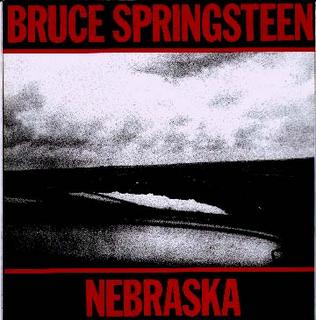'Maybe You Got a Kid/Maybe You Got a Pretty Wife/The Only Thing I Got/Has Been Bothering Me My Whole Life': Narrative and Bruce Springsteen's NEBRASKA
 We're used to studying narrative and methods of storytelling in movies and in written fiction, but sometimes we overlook how narrative is used in music, perhaps because the narratives of contemporary popular music tend to be very simple (and, to be somewhat controversial, incredibly banal).
We're used to studying narrative and methods of storytelling in movies and in written fiction, but sometimes we overlook how narrative is used in music, perhaps because the narratives of contemporary popular music tend to be very simple (and, to be somewhat controversial, incredibly banal).Before Springsteen acquired his status as a pop music icon in the 1980s, and attempted to shed that image in the 1990s, his 1982 album Nebraska was the high point of his career. Arguably, its pared-down style and its lyrical complexity ensure its status as one of the most impressive pop albums to be released during the 1980s.
What is significant about Nebraska is that each of the songs has a clearly defined narrative, and many of the songs share similar themes: as Georg Gartlgruber puts it, the album 'is a sparse, purely acoustic rendition of the fallacies and drama that everyday-lives implore on regular people. There is a lot of despair, of darkness and even brutality' (CFFA, Year Unknown: np). The songs are about the dilemmas and traumas that face working men: the songs are narrated through the viewpoint of men, with women taking a peripheral role, or as in 'Atlantic City', potentially positioned as the listener. The men who narrate the stories are struggling with their lives, and each song contributes to a greater narrative: the story of Reagan's America, as viewed through the eyes of working men suffering from a depression--this is the narrative of the album as a whole. Springsteen has reputedly claimed that Nebraska is about 'American isolation: what happens to people when they're alienated from their friends and their community and their government, and their job' (quoted in Pawlowsky, 2004: np). Consider the following line from 'Atlantic City': 'I've been looking for a job/But it's hard to find./Down here it's just winners and losers/And don't get caught on the wrong side of that line/Will I'm tired of coming out on this losing end'.
Gartlgruber insightfully comments on the issues confronted in the songs' narratives: they
fall loosely into two categories: Songs about the situation of people [...] who either are about to do something stupid, which will ruin their lives, but find no other way out of the situation life has put them into (“Atlantic City”) or just think about the dirty chips live has dealt them (“State Trooper”, “Open all night”). And then there are songs about the past, some about childhood memories (“Mansion on the hill”, “Used Cars”, “My Fathers house”) which aren’t any good or visibly show that if life deals you a bad start you will have to chew on that forever, or about the way families can run you down even if you are the good guy in the family (“Highway Patrolman”) (ibid).
In each song, Springsteen narrates from the viewpoint of a different character, deconstructing the myths associated with how American society was represented during the Reagan era, including its romanticisation of childhood (in Nebraska, the characters are damaged by their childhoods--as the poet Phillip Larkin once wrote, 'They f--k you up, your mum and dad/They don't mean to, but they do').
Despite the bleakness of most of the songs, there's a strong sense of pragmatism (and potential hope) that runs throughout the album: 'Everything dies, baby/That's a fact./But maybe everything that dies/Someday comes back' ('Atlantic City'). The album is topped off by a track entitled 'Reason to Believe' in which Springsteen asks 'We at the end of every hard-earned day/We find some reason to believe'.
References
CFFA, Year Unknown: 'Bruce Springsteen "Nebraska"'. [Online] http://www.monochrom.at/cracked/reviews/TR%20Springsteen.htm
Pawlowsky, Emily, 2004: 'Bruce Springsteen's Nebraska from a variety of theoretical perspectives'. [Online] http://www.monochrom.at/cracked/reviews/TR%20Springsteen2.htm
Original text: ©Paul Andrew Julian Lewis, 2005


1 Comments:
Hi Paul,
Nebraska is one of my favourite Springsteen album.
By the way, are you a fan of Jean-Pierre Melville's films? I love his work, especially Un flic, Le circle rouge, Le silence de la mer and Leon Morin pretre.
Post a Comment
<< Home